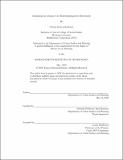Calculating governance : city benchmarking & its discontents
Author(s)
Srinivasakrishnan, Tanaya.
Download1193560465-MIT.pdf (539.7Kb)
Alternative title
Calculating governance : city benchmarking and its discontents
Other Contributors
Massachusetts Institute of Technology. Department of Urban Studies and Planning.
Advisor
Jason Jackson.
Terms of use
Metadata
Show full item recordAbstract
City benchmarks -- in the form of rankings, ratings, and other comparisons and commendations represented in different formats and (ostensibly) objectively derived -- have rapidly proliferated, such that the concepts they measure have grown in complexity, but not necessarily in sophistication. What began as genuine efforts to capture the essences (and essential differences) of places to inform those at a distance has evolved into an abstract endeavor to understand what makes a quality urban life. This thesis aims to problematize the practice of city benchmarking, understand their persistence despite evident flaws, and identify what is at stake given their widespread and continued use, especially by and for city government actors. By tracing the evolution of city benchmarks through the lens of different institutional purveyors, I identify who values benchmarks and how they are valued before locating their measurement flaws in the literature. Such flaws include that benchmarks are too reliant on technocratic expertise, valorize transparency as an unmitigated good, and ultimately deliver a flattened and decontextualized partial perspective to audiences. And yet, city actors continue to rely on them to inform various decision-making processes, as confirmed by a series of interviews I conduct with a set of urban actors primarily working in mid-tier American cities. I use these interviews, informed by the Foucauldian analytics of governmentality and discipline, to theorize about the effects and consequences of city benchmarks as governing agents. As governing agents, city benchmarks rationalize the practice of governance as one that is highly technical, specify spheres of concern for cities, transform city identities based on the statuses they bestow, and neutrally promote utopian ideals without declaring any normative commitments. I argue that the power of city benchmarks is disciplinary in nature, which is a cause for concern as city actors internalize their logics through both seductive and resistant forces.
Description
Thesis: M.C.P., Massachusetts Institute of Technology, Department of Urban Studies and Planning, May, 2020 Cataloged from the official PDF of thesis. Includes bibliographical references (pages 78-84).
Date issued
2020Department
Massachusetts Institute of Technology. Department of Urban Studies and PlanningPublisher
Massachusetts Institute of Technology
Keywords
Urban Studies and Planning.